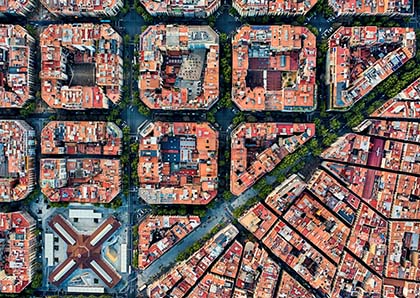
MUD-Lab Blog: Urban Design Futures
In the first of our MUD-Lab Blog posts we will be looking to the future, with an introduction to some of our upcoming events and projects, as well as a wider reflection on ‘urban design futures’ following our end-of-year symposium on this topic. Part of the MUD-Lab’s aim is to provide a central space for urban design resource and information and our blog will support this going forward, through the sharing of commentary on our industry as well as highlighting news and publications from the team.
If you are interested in discussing a possible event or contributing to a blog, then please contact our MUD-lab practice liaison Rachel Kerr.
Urban Design Futures Symposium
The practice of urban design sits alongside a diverse range of interlinked disciplines, each of which have their own focus with regard to addressing the current and future challenges faced by our urban spaces and the people who use them. As part of the Urban Design and International Planning MSc course, the MUD-Lab recently chaired a symposium focused on the topic of ‘urban design futures’ which considered how urban design projects can potentially address future challenges, in conjunction with some of these parallel disciplines. Ten professional practitioners and academics with expertise including urban design, green infrastructure, transport and connectivity, landscape architecture and ecology were brought together to share their ideas, concepts and case studies on the future of our urban spaces and how they are designed.
Three main themes emerged through the event, the first of which was the human scale and community focus. People-focused design is a long-acknowledged concept championed amongst designers, with new developments and regeneration masterplans taking into consideration appropriate land uses and connections as well as more nuanced design elements which influence how people use spaces. This discussion theme considered the importance of taking this a step further and influencing positive behaviours through design. These behaviours include engagement in community initiatives focused on sustainable living such as car and resource sharing, community recycling, active travel and supporting activities such as final-mile deliveries. Not only reaching towards sustainability goals but also providing social benefits.
The second theme continued the focus on designing for people, thinking specifically about the wide-ranging benefits of designing for all ages. Dr Mic Martin from The University of Sheffield shared his research on the benefits of integrating play into our streets, spaces and buildings in an informal setting over the provision of designated enclosed spaces for children to use. In order for this to be achieved Harriet Haldenby of PJA Associates discussed the importance of safe streets designed for people first and vehicles second and the challenges currently experienced with low traffic neighbourhoods. Fundamental behaviour changes are required in order to address the focus on car travel and the ‘complete neighbourhood,’ providing homes, jobs, education and leisure within a walkable / cyclable district is key to influencing these travel behaviours.
When considering urban design futures, we often think first of technological solutions to issues linked to climate change. The incorporation of climate resilient technology and design was the third theme to emerge from the symposium. This included design-based solutions such as green infrastructure to address water management and flooding, as well as its important role in cooling and screening. These solutions should be implemented alongside technologies and materials which help to deliver clean construction and green energy for buildings in a holistic way, along with the use of technologies for monitoring and prediction. This was highlighted by Dr Ian Thornhill of The University of Manchester as not only important in the interaction between people and place, but also between new development and the existing environment.
The MUD-Lab will be running a series of events throughout the 2022/23 academic year, some of which will explore these themes further. These events will be advertised on the MUD-Lab website, with future blog posts to discuss their content.
MUD-Lab & MoSI
We are pleased to announce that the MUD-Lab has joined a partnership with Manchester’s Museum of Science and Industry (MoSI) and will be taking part in the 2022 Science Festival in October. The theme of this year’s festival is Future Human, and the MUD-Lab will be exploring how our urban environments will look, feel and operate in the future. We will be utilising our model-building workshop and studio resources to develop an exciting interactive showcase for the event. Further information on the Science Festival will be posted on the MUD-Lab website nearer the launch so keep an eye out in the coming months.
Thank you to our symposium speakers:
- Dr Taki Sonbli, The University of Manchester
- Harriet Haldenby, PJA Associates
- Joe Greenhalgh and Davide Colombo, AECOM
- Dr Mic Martin, The University of Sheffield
- Mark Graham, LDA Design
- Dr Ian Mell, The University of Manchester
- Dr Ian Thornhill, The University of Manchester
- Eleasha Iyawa, Tetra Tech
- Rachel Kerr, The University of Manchester



0 Comments